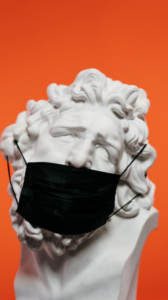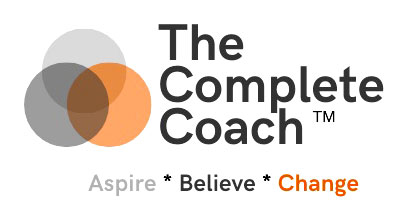– c
Mask: (Noun) a covering for all or part of the face, worn as a disguise, or to amuse or frighten others; (Verb) to conceal something from view.
The wearing of face coverings has long been an integral part of life for many. In certain cultures, they are worn out of respect to faith or tradition; in many professions, they’re a necessary encumbrance to protect against the risk of physical harm, such as by healthcare staff, scientific, factory or construction workers. Then there are the actors and performers, for whom a mask is both literal and figurative: it may be a material disguise they use to portray a particular character, although more commonly it’s a metaphorical ‘mask’, whereby their physical appearance remains the same, but they adopt an entirely different persona.
To all those people familiar with the trials and tribulations of wearing a mask, I offer respect! The COVID-19 pandemic has brought mask-wearing to a global population; indeed, it has come to define our daily lives. And it isn’t always easy … Many of us are making the best of a necessary ‘evil’ by wearing decorative face coverings, or even capitalising on promotion opportunities with branded designs. But however willingly we embrace this enforced safety/fashion accessory, it is not without its complications and consequences, and as we enter the second year of coronavirus-dictated restrictions, I have been pondering these.
In broad strokes, we can point to a mask as having a dual purpose: on the one hand, protection; on the other, projection. In the former context, we are concerned with safety; in the latter, we seek disguise or reinvention.
Intrinsically, what all mask wearers have in common is that their faces, to a large extent, are hidden – and when we consider that non-verbal communication is universally considered by psychologists to be vastly more significant than verbal, with facial expression being most critical of all in terms of conveying emotion and establishing human connection, it is little wonder that we’re all feeling a degree of discomfort and disconnection as we go about our daily lives in 2021. When passing people in the streets, or having conversations in shops, or even meeting friends we know well, if our faces our covered, it’s not always easy to perceive how someone is reacting to you – or feeling in themselves.
Right now, there is an unavoidable barrier between us all during social interaction – a blank screen, if you like. And the human brain does not like blank screens; in fact, it’s programmed to fill them in. When we’re unable to clearly see visual clues to a person’s emotions, our unconscious mind tends to write its own script, based on internalised pre-supposition and anxieties: Are they angry? Are they laughing at me? This, of course, leaves us feeling insecure about being misjudged, while at the same time concerned about misjudging others, and so we over-project our reactions, to make sure we’re giving off the right impression.
It occurs to me that this deliberate ‘projection’ of persona isn’t new and exclusive to these mask-wearing pandemic times, and I’m reminded of how often during my 30-year career I’ve heard people comment that they feel like they have to ‘wear a mask’ when they come to work. Pondering again the dual purpose of protection and projection, I’m struck by how this aligns with one of the most common issues I hear from my coaching clients: how to feel more in tune with their own needs and values, and become more authentic in their working lives.
We all want to present our best selves at work. None of us (I would guess!) is attending our current schedule of virtual meetings dressed in pyjamas, hair unbrushed and with last night’s dinner plates piled around us. Nor would we stroll into our offices and put our feet up on the desk, regaling our colleagues in detail about the row we’ve just had with our partner. Those casual behaviours belong to our private world and more intimate relationships.
On the flip side, it isn’t helpful to adopt a completely fake persona. If we spend every hour of our working day pretending to be something or someone we’re not, the mental strain will be enormous. Psychological safety at work remains a huge issue within companies, and there is still much work to be done in terms of bringing about a cultural shift to help employees feel more comfortable about making mistakes and admitting gaps in their knowledge. These are all growth opportunities: if we never fail at anything, how can we learn to do better?
There has to be a balance between the personal and the professional: allowing our true personalities to shine through at work is a vital part of living well and flourishing professionally, while maintaining respectful boundaries and conduct. In times of economic uncertainty, or where there isn’t a work culture of psychological safety, there’s a danger that we choose to hide parts of our personality because we consider them ‘unsuitable’. In doing so, we may repress our innate creativity, energy or drive to succeed, for fear of being judged. We may also hide our empathy and compassion, projecting an over-professionalised image that doesn’t allow our colleagues to see even a glimpse of who we are ‘behind the mask’.
In other words, there’s a fine line between projection and protection. Wearing a ‘mask’ at work is fine up to a point: it allows us to feel more professional and in control. But if we hide ourselves completely, we risk coming across as detached leaders and cold, unempathic colleagues; we allow others to fill in the blanks and write their own mental script about us, because we aren’t showing enough of who we really are – or, indeed, even giving ourselves the chance to discover and fully become our true selves. The consequences can be poor working relationships, lowered performance levels, frustration and damaged mental health.
At this point, I’m reminded of the popular TV programme The Masked Singer, and the audience’s exuberant chants of ‘Take it off! Take it off!’ Out of pure human curiosity, we are all desperate to discover who is ‘behind the mask’; in our working lives, for there to be genuine engagement, respect and effective interaction with our colleagues, I believe we need to.
As you might imagine, this fine line can be tricky to walk. How can we be open and authentic, and learn to embrace the power of our vulnerability – and the opportunity for growth and self-discovery it offers us?
As an Executive, Leadership & Wellbeing Coach, I can support you to explore and strengthen your:
• Self-awareness: unpicking what is important to you, your values, motivators, goals and aspirations – and reflecting on obstacles that may be stopping you achieve them;
• Self-empowerment: reminding yourself of the strengths you have, the value you bring, thereby building your self-confidence to give your true opinions and behave congruently, without fear of judgement;
• Self-actualisation: becoming your true self and walking your chosen path, your way, with the resilience to encounter challenge, manage conflict and continue to thrive.
In conclusion: What lies behind the mask? You. The person you want to be, with all the unique qualities you have to contribute to the world. What are the benefits of taking the mask off? Becoming more accepting of yourself and comfortable with others: living an authentic life, with professionalism but without pretence. Right now, we all need to stay home, stay safe – and wear that mask. But, please, in the best interests of your mental and emotional health, as well as your sense of purpose and connection at work, let it only be a physical one.

Fascinating and thought-provoking piece, and very timely, too!
Thank you so much for reading my blog post – I am glad it resonated for you. Paul
A really interesting read. I have certainly worn many masks in the workplace, in order to ‘blend in’. The whole point of our existence is not to simply blend unnoticed, but to stand in our own light. Interesting and thought provoking
Danielle, thanks so much for reading the blog. I am most grateful to you for sharing your own experiences. Paul